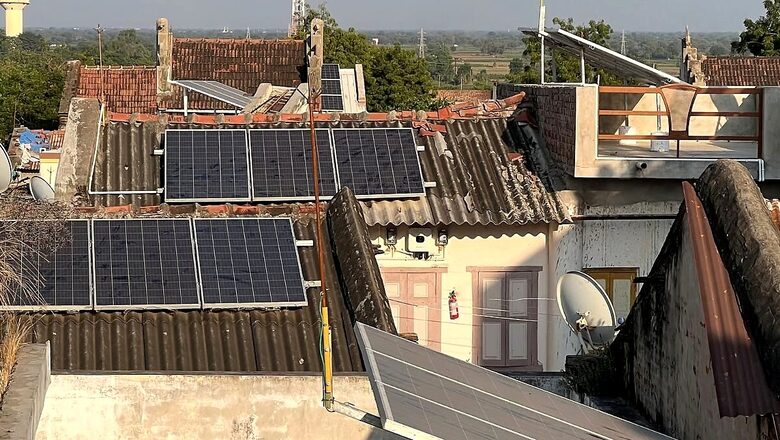
views
As the Union Budget 2024 approaches, industry leaders from the energy sector are voicing their expectations and hopes for supportive policies and reforms. Kapil Garg, Chairman & Managing Director of Oilmax Energy, emphasises the need for regulatory changes and GST incorporation to stabilise gas prices and boost oil exploration investments. Amit Uplenchwar of Kalpataru Projects International Limited (KPIL) calls for swift government actions to support advanced energy solutions and infrastructure development.
Experts like Neerav Nanavaty, CEO of BluPine Energy, highlight the importance of boosting renewable sector support to drive innovation and ensure project execution. Sharad Pungalia of Amplus Solar urges the alleviation of tax burdens on solar projects and better credit access for MSMEs.
N.P Ramesh, COO of Orb Energy, anticipates measures to enhance residential solar adoption and incentivize commercial investments.
These industry voices collectively underscore the necessity for strategic government interventions to propel the energy sector towards a sustainable and prosperous future.
Oil and Gas Sector
Kapil Garg, Chairman & Managing Director, Oilmax Energy, is optimistic that the needs of the oil and gas sector will be recognised and addressed.
This sector has the potential to grow rapidly, but it requires supportive regulatory reforms to be implemented promptly.
“Incorporating GST into gas pricing is crucial at this juncture. Stabilising gas prices across the nation, which have been inconsistent and created significant disparities within the industry, is equally important,” Garg says.
Investment In Oil Exploration
Garg adds that with a potential decline in oil production by 2030, increasing investment in oil exploration is essential. This will not only build confidence among domestic players to venture beyond shallow waters and into deep-sea exploration but also ensure sustained growth in capacity, he says.
Continued capital expenditure (CAPEX) investment is necessary, particularly in energy, logistics, and infrastructure, including gas pipelines and railway corridors.
‘Swift Government Actions On Energy Project Approvals’
Amit Uplenchwar, Director, Kalpataru Projects International Limited (KPIL), highlights that the government has set ambitious targets for deploying advanced energy solutions, including clean hydrogen, energy storage, and carbon capture, with a planned investment of $35 billion annually until 2030.
“The industry requires swift government actions on project approvals and supportive policies for sustainable energy transmission and dissemination, such as production-linked incentives, tax credits, and subsidies. GAIL’s proposal for a 1500 KTPA ethane cracker unit in Madhya Pradesh could be a game-changer, fostering numerous public-private partnerships and generating thousands of jobs,” Uplenchwar says.
Uplenchwar also adds that significant government intervention is needed in the oil & gas, energy, and transmission & distribution (T&D) sectors in the form of financial aid and support for technology development, and to keep up the infrastructure momentum which are crucial for domestic business growth.
Skilled Workforce In the Renewable Sector
Neerav Nanavaty, CEO at BluPine Energy urges the government to significantly boost support for the renewable sector, pivotal for driving innovation and ensuring efficient project execution.
Nanavaty underlines that a skilled workforce is crucial to meet escalating demands and push technological boundaries forward.
Grid Infrastructure
Nanavaty notes that the seamless integration of renewable sources into a resilient grid infrastructure will enhance national reliability and resilience. Robust regulations for the C & I sector will not only attract investments but also streamline operations, fostering sustainable growth.
“We expect increased support in the solar sector through adequate funding and favourable policies, essential for driving innovation and expanding clean energy deployment. Despite challenges such as high initial costs and regulatory complexities, robust incentives and streamlined processes are imperative to make solar power more accessible and affordable. This strategic focus will propel India towards a brighter, greener future, reinforcing our global leadership in clean energy innovation and sustainability,” Nanavaty adds.
Support Solar Projects
Sharad Pungalia, MD & CEO of Amplus Solar urges the government to support solar projects by alleviating the existing tax burden on project costs, especially now that the Approved List of Models and Manufacturers (ALMM) has been fully implemented.
Pungalia says that there must be rationalisation of GST across all components of the solar sector, and the government should consider eliminating the Basic Customs Duty (BCD) on solar modules.
Battery Energy Storage Systems
Pungalia points out that implementing concessional duties on Battery Energy Storage Systems (BESS) is crucial to advancing our storage capabilities and ensuring a stable and reliable energy supply.
Credit Access for MSMEs
MSMEs represent a significant demand sector, particularly for rooftop and residential solar projects. By integrating them more comprehensively into the financial system, we can significantly boost capacity additions and drive growth within the solar sector, Pungalia says.
Pungalia expects the budget to facilitate increased credit access for Micro, Small, and Medium Enterprises (MSMEs) through targeted lending by financial institutions.
Enhancing Residential Solar Adoption
N.P Ramesh, Co-founder and COO, Orb Energy, says the solar industry eagerly anticipates pivotal measures to accelerate India’s renewable energy goals.
According to Ramesh, key priorities include enhancing residential solar adoption with proposed personal income tax benefits up to 3 lakhs.
“This can be considered instead of the current subsidy of Rs.78,000. For commercial and industrial (C&I) sectors, increasing depreciation benefits to 60-80% from the current 40% will incentivize substantial investments in solar installations, bolstering sustainability efforts across businesses,” Ramesh adds.
Anti-dumping Duties
Ramesh also urges the removal of anti-dumping duties on raw materials for solar modules is crucial to enhancing manufacturing competitiveness and reducing dependency on imports.
Additionally, a proposed 7-year tax holiday for investments in PV module or solar cell production will stimulate domestic manufacturing capabilities, fostering job creation and economic growth, Ramesh says.



















Comments
0 comment